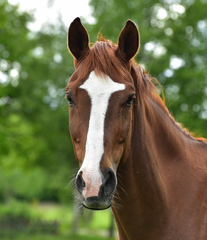
We frequently hear of antioxidants, but are unsure what that really means. We know they’re good for you. But how can we leverage this information for our horses?
Oxidative Damage
Oxidative damage creates deleterious changes in DNA, RNA, and proteins. This results in our body tissues working less than optimally, even to the point of organ compromise. Because this is insidious and occurs over time, it is easy to underestimate the damage that is done.
Some of the oxidative damage that is caused in the body is short term, like recovering from intense exercise or a bacterial infection. However, it’s the oxidative damage from long term exposure, or chronic conditions that have the potential to be most debilitating in life.

Common causes of oxidative damage in the horse:
► Short term oxidative damage:
» Intense exercise causes damage, but the recovery time is usually short.
» Illnesses: bacterial of viral are usually limited to the period of time of the actual illness.
► Oxidative damage that can become long-term or very problematic
» Histamine release (think allergies)
◦ Skin itchiness. Some skin conditions cause a massive reaction, interfering with the quality of life.
◦ Breathing issues, such as stable cough or airway inflammation, can become severe.
» Chronic illness or conditions. Examples include debilitation from chronic Lyme disease, or chronic arthritis.
» Age-related decline. These include PPID and muscle loss.

The question then becomes, how can we best protect our horses from this long-term damage?
► Engineer the environment to reduce the stressors
➡ Well ventilated stables for better air quality in a barn
➡ Keep stalls clean, to reduce ammonia and dust issues
➡ Fly control to reduce the reaction to flies (fly traps and tapes, fly sprays, barrier protection)
► Be cognizant of the health care stressors
➡ Deworm when needed
➡ Treat diseases when appropriate, such as lyme disease
➡ Understand that some vaccines are necessary, but they are also system stressors
➡ Reduce joint stressors by ensuring balanced hoof care
➡ Treat chronic degenerative conditions promptly to reduce damage (think chronic breathing issues or osteoarthritis)

Horses get their antioxidants from food. But how can we protect our horses if they don’t eat enough antioxidants to cope with their issues? We can add supplements that are high in antioxidants to their diet.
What are some good antioxidant supplements to help our horse? There are many, but these are some of the most popular:
➡ Mov-Ease
When is the best time to supplement antioxidants?
Start antioxidants as soon as you detect a challenge. It’s easier to stop a runaway train before it leaves the station than after it’s already a runaway.
We do the best we can do for our horses. Consider antioxidants to help avoid long-term issues.
Disclaimer: Statements regarding dietary supplements have not been evaluated by the FDA and are not intended to diagnose, treat, cure, or prevent any disease or health condition.